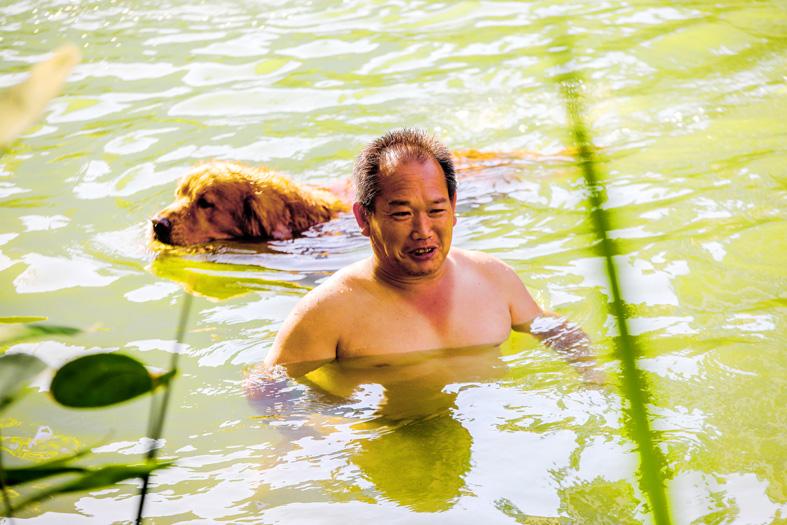Searing summer heat waves are expected to return this week across large parts of China, lasting through late next month, despite brief interludes of seasonal rain, the China Meteorological Administration said on Sunday.
Temperatures from 39°C to 42°C are expected in the southern region after Wednesday, including the provinces of Jiangxi, Zhejiang and Fujian, the national weather forecaster said.
Despite some weekend respite for provinces such as Hebei, Hunan, Hubei, Guizhou and Jiangxi, maximum temperatures elsewhere were expected to hover over 37°C.

Photo: EPA-EFE
The sweltering heat was forecast to last until Aug. 25 nationwide for an “extended period” of 40 days, up from the usual 30, the forecaster said on its Web site.
The so-called “sanfu,” or “three periods of laying low” during China’s summer refers to three annual 10-day stretches between July and August when temperatures and humidity peak.
However, this year, the second phase is expected to run for 20 days from Tuesday next week to Aug. 14, it said.
China has broiled in average temperatures of about 35°C for the past two weeks, bringing buckled roads and more hospital visits because of heat stroke, sparking discussion on social media.
Heat waves have gripped several nations as raging forest fires sweep parts of Europe.
Temperatures on the US west and southeast coasts have regularly hit 40°C to 45°C for several days.
Yesterday, the Hong Kong observatory again warned of very hot weather in the territory.
Chinese forecasters said the number of cities with high temperatures has gradually increased over the past 30 years.
Many experts blame persistent high temperatures on global climate change.

POLITICAL PRISONERS VS DEPORTEES: Venezuela’s prosecutor’s office slammed the call by El Salvador’s leader, accusing him of crimes against humanity Salvadoran President Nayib Bukele on Sunday proposed carrying out a prisoner swap with Venezuela, suggesting he would exchange Venezuelan deportees from the US his government has kept imprisoned for what he called “political prisoners” in Venezuela. In a post on X, directed at Venezuelan President Nicolas Maduro, Bukele listed off a number of family members of high-level opposition figures in Venezuela, journalists and activists detained during the South American government’s electoral crackdown last year. “The only reason they are imprisoned is for having opposed you and your electoral fraud,” he wrote to Maduro. “However, I want to propose a humanitarian agreement that

ECONOMIC WORRIES: The ruling PAP faces voters amid concerns that the city-state faces the possibility of a recession and job losses amid Washington’s tariffs Singapore yesterday finalized contestants for its general election on Saturday next week, with the ruling People’s Action Party (PAP) fielding 32 new candidates in the biggest refresh of the party that has ruled the city-state since independence in 1965. The move follows a pledge by Singaporean Prime Minister Lawrence Wong (黃循財), who took office last year and assumed the PAP leadership, to “bring in new blood, new ideas and new energy” to steer the country of 6 million people. His latest shake-up beats that of predecessors Lee Hsien Loong (李顯龍) and Goh Chok Tong (吳作棟), who replaced 24 and 11 politicians respectively

Young women standing idly around a park in Tokyo’s west suggest that a giant statue of Godzilla is not the only attraction for a record number of foreign tourists. Their faces lit by the cold glow of their phones, the women lining Okubo Park are evidence that sex tourism has developed as a dark flipside to the bustling Kabukicho nightlife district. Increasing numbers of foreign men are flocking to the area after seeing videos on social media. One of the women said that the area near Kabukicho, where Godzilla rumbles and belches smoke atop a cinema, has become a “real

‘WATER WARFARE’: A Pakistani official called India’s suspension of a 65-year-old treaty on the sharing of waters from the Indus River ‘a cowardly, illegal move’ Pakistan yesterday canceled visas for Indian nationals, closed its airspace for all Indian-owned or operated airlines, and suspended all trade with India, including to and from any third country. The retaliatory measures follow India’s decision to suspend visas for Pakistani nationals in the aftermath of a deadly attack by shooters in Kashmir that killed 26 people, mostly tourists. The rare attack on civilians shocked and outraged India and prompted calls for action against their country’s archenemy, Pakistan. New Delhi did not publicly produce evidence connecting the attack to its neighbor, but said it had “cross-border” links to Pakistan. Pakistan denied any connection to